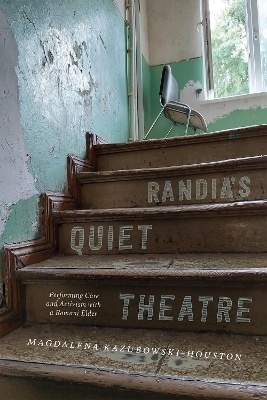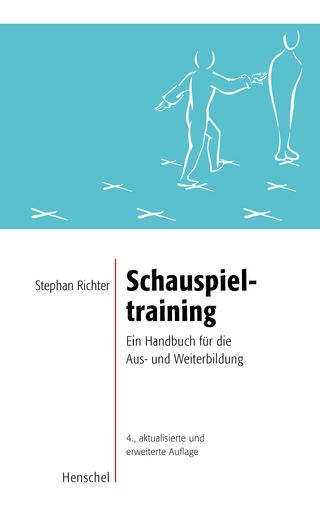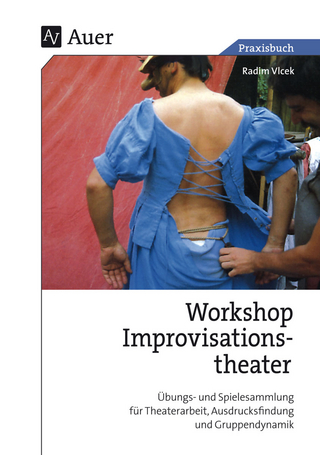
Randia’s Quiet Theatre
Performing Care and Activism with a Romani Elder
Seiten
2025
McGill-Queen's University Press (Verlag)
978-0-2280-2478-1 (ISBN)
McGill-Queen's University Press (Verlag)
978-0-2280-2478-1 (ISBN)
- Noch nicht erschienen (ca. Mai 2025)
- Versandkostenfrei innerhalb Deutschlands
- Auch auf Rechnung
- Verfügbarkeit in der Filiale vor Ort prüfen
- Artikel merken
Randia’s Quiet Theatre draws on autofiction, interviews, and performance ethnography to unravel the politics of aging in Poland, while revealing how theatre and ethnography can become springboards for creating worlds in which the elderly can live with dignity.
Throughout Poland, tens of thousands of elderly people live with disabilities in four-storey walk-up apartment buildings. In many cases their children have emigrated; they live with loneliness, a lack of basic amenities, silence, and the absence of care. They are known as “prisoners of the fourth floor.”
In Randia’s Quiet Theatre Magdalena Kazubowski-Houston mixes autofiction, ethnography, and theatrical improvisation to unravel the politics of aging in Poland. At the centre of the book is Randia, a Romani fortune-teller, storyteller, and performer confined to her fourth-floor apartment in old age. In interviews, Randia’s identity is fixed: she tells of the hardships she faced as a Romani girl and as a wife, mother, and grandmother whose relationship with her family was shaped by separation, sickness, and death. But in storytelling sessions staged in her home, Randia steps into characters and is freed: her stories move between the past, the present, and the future, across life and death; her characters look after one another and change history. Kazubowski-Houston finds in Randia’s performances a quiet activism through which she envisages alternative lives and articulates an ethics of care among individuals, communities, and spirits.
Interwoven throughout Randia’s Quiet Theatre are Kazubowski-Houston’s own stories about caring for her elderly and disabled mother, making the book a collaborative, reflexive, and complex creative work. It reveals how ethnographers and their interlocutors can stand on more equal ground. Ultimately it is a profound reflection on how the elderly can live with dignity and how we can care for each other.
Throughout Poland, tens of thousands of elderly people live with disabilities in four-storey walk-up apartment buildings. In many cases their children have emigrated; they live with loneliness, a lack of basic amenities, silence, and the absence of care. They are known as “prisoners of the fourth floor.”
In Randia’s Quiet Theatre Magdalena Kazubowski-Houston mixes autofiction, ethnography, and theatrical improvisation to unravel the politics of aging in Poland. At the centre of the book is Randia, a Romani fortune-teller, storyteller, and performer confined to her fourth-floor apartment in old age. In interviews, Randia’s identity is fixed: she tells of the hardships she faced as a Romani girl and as a wife, mother, and grandmother whose relationship with her family was shaped by separation, sickness, and death. But in storytelling sessions staged in her home, Randia steps into characters and is freed: her stories move between the past, the present, and the future, across life and death; her characters look after one another and change history. Kazubowski-Houston finds in Randia’s performances a quiet activism through which she envisages alternative lives and articulates an ethics of care among individuals, communities, and spirits.
Interwoven throughout Randia’s Quiet Theatre are Kazubowski-Houston’s own stories about caring for her elderly and disabled mother, making the book a collaborative, reflexive, and complex creative work. It reveals how ethnographers and their interlocutors can stand on more equal ground. Ultimately it is a profound reflection on how the elderly can live with dignity and how we can care for each other.
Magdalena Kazubowski-Houston is associate professor in the Department of Theatre, Dance & Performance at York University and the author of Staging Strife: Lessons from Performing Ethnography with Polish Roma Women.
| Erscheint lt. Verlag | 13.5.2025 |
|---|---|
| Zusatzinfo | 13 photos |
| Verlagsort | Montreal |
| Sprache | englisch |
| Maße | 152 x 229 mm |
| Themenwelt | Kunst / Musik / Theater ► Theater / Ballett |
| Sozialwissenschaften ► Ethnologie | |
| Sozialwissenschaften ► Soziologie | |
| ISBN-10 | 0-2280-2478-1 / 0228024781 |
| ISBN-13 | 978-0-2280-2478-1 / 9780228024781 |
| Zustand | Neuware |
| Haben Sie eine Frage zum Produkt? |
Mehr entdecken
aus dem Bereich
aus dem Bereich
ein Handbuch für die Aus- und Weiterbildung
Buch | Softcover (2024)
Henschel Verlag in E. A. Seemann Henschel GmbH & Co. KG
24,95 €
Übungs- und Spielesammlung für Theaterarbeit, Ausdrucksfindung und …
Buch (2023)
Auer Verlag
31,99 €


